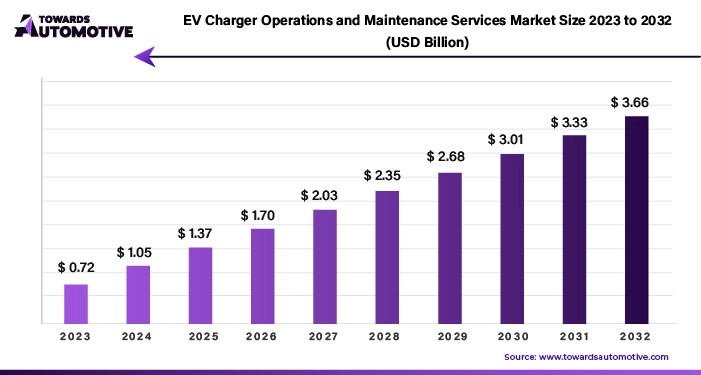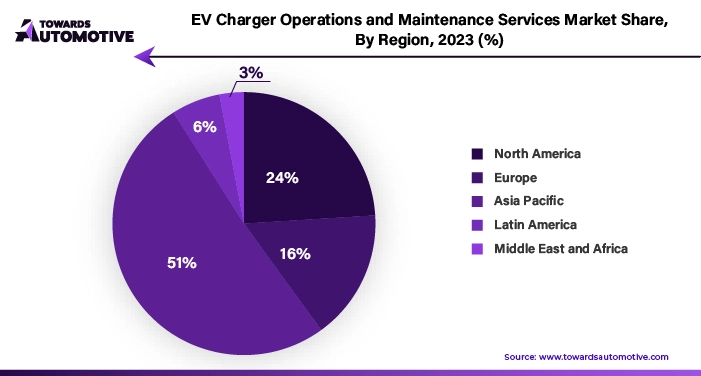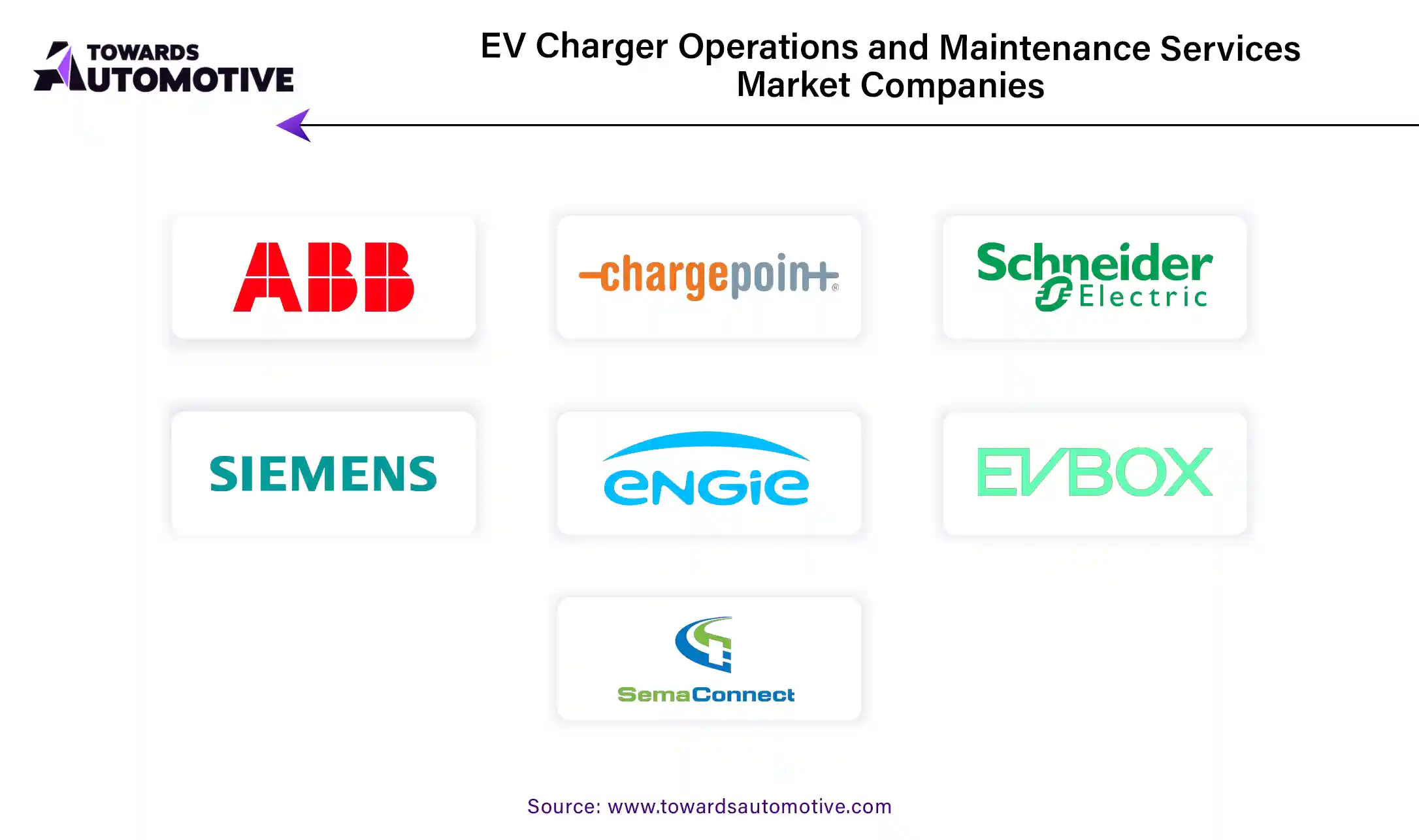October 2025
The ev charger operations and maintenance services market is forecasted to expand from USD 0.95 billion in 2025 to USD 3.32 billion by 2034, growing at a CAGR of 14.92% from 2025 to 2034.

Growth is propelled by the accelerating adoption of electric vehicles (EVs) worldwide, coupled with the increasing need for reliable and efficient charging infrastructure to support the burgeoning EV ecosystem. As the transition towards electrification gains momentum, the demand for comprehensive operations and maintenance services for EV charging stations is expected to surge, creating lucrative opportunities for market players.
One of the primary drivers of market growth is the rapid expansion of the electric vehicle market, driven by stringent emissions regulations, government incentives, and shifting consumer preferences towards sustainable mobility solutions. With an increasing number of automakers introducing electric vehicle models and governments implementing policies to promote EV adoption, the demand for EV charging infrastructure is witnessing a significant upsurge. This, in turn, fuels the need for efficient operations and maintenance services to ensure the reliability, availability, and optimal performance of EV charging stations.
Moreover, advancements in EV charging technology, including fast-charging solutions, wireless charging, and smart charging systems, are driving the demand for specialized operations and maintenance services. As EV charging infrastructure becomes more sophisticated and complex, the expertise required to install, operate, and maintain these systems also increases. Market players offering comprehensive operations and maintenance services play a vital role in optimizing the performance and longevity of EV charging stations, thereby enhancing the overall EV charging experience for consumers.
Furthermore, the emphasis on sustainability and resilience in energy infrastructure is propelling investments in EV charging infrastructure operations and maintenance. Governments, utilities, and private sector entities are increasingly recognizing the importance of building robust and resilient EV charging networks to support the transition to clean transportation. This includes proactive maintenance, remote monitoring, and predictive analytics to minimize downtime, optimize energy efficiency, and ensure the seamless operation of EV charging infrastructure.
Despite the positive growth outlook, the EV charger operations and maintenance services market face several challenges and constraints that may hinder its expansion. One of the primary challenges is the lack of standardized protocols and regulations governing EV charging infrastructure operations and maintenance. As the EV market evolves rapidly, there is a need for clear guidelines and standards to ensure interoperability, safety, and reliability across different charging networks and service providers.
Moreover, the complexity of EV charging infrastructure, including the integration of renewable energy sources, energy storage systems, and grid management technologies, poses technical challenges for operations and maintenance service providers. Ensuring compatibility, interoperability, and cybersecurity of EV charging systems requires specialized expertise and continuous training to keep pace with evolving technology trends and regulatory requirements.
Furthermore, financial viability and sustainable business models remain key concerns for EV charger operations and maintenance service providers. The high upfront costs associated with deploying and maintaining EV charging infrastructure, coupled with uncertainties surrounding revenue streams and utilization rates, present challenges for market players seeking to scale their operations profitably. Addressing these challenges requires innovative approaches to financing, business model innovation, and collaboration between stakeholders across the EV value chain.
The COVID-19 pandemic has had a multifaceted impact on the EV charger operations and maintenance services market, presenting both challenges and opportunities for industry players. During the initial phases of the pandemic, lockdown measures, travel restrictions, and economic uncertainties led to a temporary slowdown in EV adoption and infrastructure investment. This, in turn, affected the demand for operations and maintenance services for EV charging stations, as installations and upgrades were put on hold.
However, as the world gradually emerges from the pandemic and economic recovery efforts gain momentum, the EV market is expected to rebound, driving renewed investments in charging infrastructure operations and maintenance. Governments and utilities are likely to prioritize stimulus packages and green recovery initiatives that promote sustainable transportation and infrastructure development, providing a boost to the EV charger operations and maintenance services market.
Furthermore, the pandemic has underscored the importance of resilient and reliable infrastructure, including EV charging networks, in supporting essential services and maintaining economic stability. This recognition is expected to drive increased investments in operations and maintenance services for EV charging infrastructure, as stakeholders seek to enhance the reliability, efficiency, and resilience of charging networks in the post-pandemic era.
Several trends are shaping the evolution of the EV charger operations and maintenance services market, including
The adoption of electric vehicles (EVs) is rapidly gaining momentum worldwide, driven by a combination of factors such as rising environmental awareness, governmental initiatives promoting sustainable transportation, and advancements in EV technology. In the Asia Pacific region, this trend is particularly pronounced, with countries increasingly prioritizing clean energy and sustainable mobility solutions to address environmental challenges and reduce carbon emissions.

One of the key drivers behind the growing adoption of EVs in the region is the rising awareness of environmental issues and the need to transition towards cleaner transportation alternatives. Governments across Asia Pacific are implementing policies and incentives to encourage the adoption of EVs, including subsidies for EV purchases, tax incentives, and the development of charging infrastructure. These initiatives aim to reduce air pollution, mitigate climate change, and enhance energy security by promoting the use of electric vehicles powered by renewable energy sources.
Moreover, investments in smart city initiatives are contributing to the expansion of EV charging infrastructure across the region. As urban populations continue to grow, cities are facing challenges related to congestion, pollution, and energy consumption. In response, governments and city planners are investing in smart transportation solutions, including EV charging networks, to create more sustainable and livable urban environments. These initiatives drive the demand for operations and maintenance services for EV chargers, ensuring the reliability and efficiency of charging networks in smart cities.
Furthermore, the EV charging industry in Asia Pacific is benefiting from technological advancements and collaborations among stakeholders. Innovations in EV charging technology, such as faster charging speeds, wireless charging, and vehicle-to-grid (V2G) integration, are improving the convenience and accessibility of charging infrastructure. Additionally, collaborations between governments, utilities, automotive manufacturers, and technology providers are facilitating the deployment of interoperable charging networks and standardization of charging protocols, further enhancing the reliability and interoperability of EV charging infrastructure.
As Asia Pacific nations continue to transition towards clean energy and sustainable transportation, the demand for operations and maintenance services for EV chargers is expected to grow significantly. Service providers play a crucial role in ensuring the reliability, uptime, and performance of EV charging networks, thereby supporting the widespread adoption of electric vehicles and contributing to the region's sustainable development goals.

These companies offer a wide range of services, including preventive maintenance, remote monitoring, software updates, and on-demand repair services, to support the operation and maintenance of EV charging infrastructure worldwide.
The EV charger operations and maintenance services market can be segmented based on various factors, including service type, charger type, end-user, and geography.
By Service Type
By Charger Type
By End-User
By Geography
October 2025
October 2025
October 2025
October 2025
We offer automotive expertise for market projections and customizable research, adaptable to diverse strategic approaches.
Contact Us